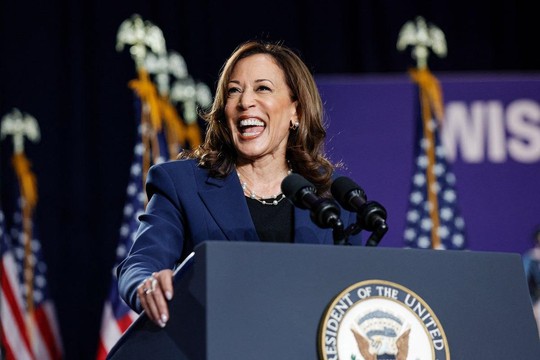Photo: NYT
There is little that can be deciphered about Kamala Harris' views on foreign policy because she speaks with a carefully cultivated language of American exceptionalism and international order that obfuscates more than it illuminates, writes Angus Reilly, an assistant editor at ‘The Engelsberg Ideas’.
Harris’ sudden elevation as the Democratic party’s presidential candidate casts everything she has ever done and said in an intense spotlight. Observers are unpicking and interrogating Harris’ life, from her childhood as the daughter of immigrant parents to her experiences at the historically African-American Howard University, her career as a prosecutor in California, work as a senator and membership of the Senate Intelligence Committee.
Harris’ tenure as vice-president since January 2021 has tied her to Joe Biden as a nodding, smiling associate, in perfect synchronicity with the administration. Her primary role has been to stand ready and now she has been called to centre stage. The fundamental unity between Harris and Joe Biden on most issues both aids and distorts the ongoing queries about her potential tenure as president of the United States. Journalists and international observers are dissecting and interpreting her statements from her service as a senator and vice-president. The world is asking what Kamala Harris believes and scrambling for answers.
Harris’ statements on foreign policy over her tenure as vice-president have been limited and, as they are meant to, broadly map onto Joe Biden’s views. Her involvement in foreign policy during her time as a senator from California has also yielded little insight into her worldview. Nonetheless, interpretations of her perspective on America’s role and responsibilities in the world has been conjured out of the limited evidence by analysts searching for overlap and differences with Biden.
The challenge is not a lack of material; Harris has given numerous speeches on international affairs as vice-president. What is paradoxically striking, rather, is how little can be discerned from the numerous profiles and interviews about what she believes and might do in office. Like much of the Western political elite, Harris speaks an empty language of international order that hits essential notes but conveys little of substance.
Kamala Harris’ comments on foreign policy evince a popular yet shallow understanding of American achievements and threats that offer little meaningful indication of what she might do as president. In 2019, for example, she discussed her beliefs about foreign policy with the Council on Foreign Relations. Harris cited the ‘postwar community of international institutions, laws, and democratic nations we helped to build’ in important contrast to Trump ‘disregarding diplomacy, withdrawing from international agreements and institutions, shunning our allies, siding with dictatorships over democracies, and elevating sheer incompetence in his decision-making processes’.
To become president, candidates must affirm a particular set of principles. First, they must display an appreciation of the United States’ magnanimous role in building the postwar international community. From there, China is invariably cited as the foremost threat to the international system; America’s commitment to its European partners is dutifully reassured; the invasion of Iraq is condemned alongside pledges to avoid future entanglements; and climate change receives the obligatory mention.
The ‘liberal international order’ has become an accepted synecdoche for these themes but its overuse has allowed the substance it represents to fade. In the 2024 campaign, the Democrats’ approach has fixated on Trump’s perceived existential significance allowing them to evade proper discussion about the challenges facing the United States – from the nature of American support for Ukraine to its relationship with Israel to the threat to Taiwan. The rhetoric of urgency and the language of the international order distort and obfuscate, setting the paradigm of debate away from a deep consideration of American power and its limitations.
Under Biden, Vice-President Harris has reinforced the argument that the former, and possibly future, president poses a dire threat to the international system, escalating the political discourse to a tenor that lets smaller, but undoubtedly important, subjects pass by without sufficient scrutiny. ‘In these unsettled times,’ Harris told the Munich Security Conference in 2024, ‘it is clear: America cannot retreat. America must stand strong for democracy. We must stand in defence of international rules and norms, and we must stand with our allies.’
The clarity of political speech degrades, however, when stakes are elevated and clarion calls for the supremacy of international order have become so lofty that they drift far above reality. President Harris’ foreign policy will not extend uninterrupted from her predecessor. There will be substantive differences that are worth understanding. Her term will confront urgent crises and tangible questions of blood and money about Ukraine, China, Israel and Palestine and she will react differently to Biden.
read more in our Telegram-channel https://t.me/The_International_Affairs

 10:02 29.07.2024 •
10:02 29.07.2024 •























